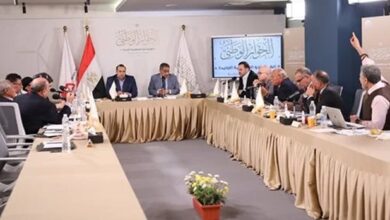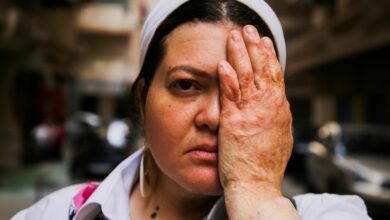From Assiut to Alexandria, anger is still palpable for many Coptic Christians after recent attacks against their community, which constitutes an estimated 10 percent of the Egyptian population.
At a candlelight vigil on Friday, which brought together hundreds of Christians in Cairo’s Ezbet el-Nakhl district, Coptic Christians marked the tenth anniversary of sectarian clashes in the village of Kosheh in the city of Sohag in Upper Egypt, which between 1998 and 2000 saw some of the worst sectarian clashes on record between Muslims and Christians. The episode began with the murder of a Muslim, an incident that later spurred a violent backlash against Christians, leaving more than 20 people dead and more than 1200 Copts in police detention.
Last Friday, Christians wore black t-shirts reading "The Coptic Regiment," vowing that they would "never forget" while singing funerary hymns. They held aloft banners bearing their demands–which include a unified law for building religious edifices such as churches–and signs reading "Sinister hands killed our sons’ and daughters’ happiness on Christmas eve." They also bore photos of victims of violence and circulated petitions against teaching religion in schools, in hopes this would end discrimination against their coreligionists.
Archpriest Mettias Nasr of the Virgin Mary Church, also editor-in-chief of an online Coptic newspaper, told Al-Masry Al-Youm that the event was "the least that could be done to honor the martyrs who lost their lives to oppression and terrorism."
At the time of the Kosheh affair, Christian voices had said the incident was part of a pattern of violent attacks against them and that it constituted a turning point in the escalation of tension between the two communities. In line with these predictions, the Kosheh anniversary came almost 40 days after the most recent attacks against Copts, which took place last month following mass on Coptic Christmas eve, as six church deacons and a Muslim church guard were shot dead and ten more gravely wounded in a drive-by shooting in Upper Egypt.
Many believe the act had been planned weeks in advance, given that several Christians had previously received threats. The attack took place in Naga Hammadi, a town densely populated by Copts and rich in Christian history. Ancient texts known as the Naga Hammadi library and the so-called "gnostic gospels" were discovered there in 1945 and 1989 respectively.
In Alexandria, similar marches were staged by groups of Christian youths in honor of the victims of both the Kosheh and Naga Hammadi killings. According to independent daily Al-Dostour, 200 Copts staged demonstrations on the same day at a church in Shubra el-Kheima.
In Assiut, which was a nexus of Islamic militancy in the 1990s, the effects of Naga Hammadi reverberated for weeks among the Christian community. One church worker told Al-Masry Al-Youm–on condition of anonymity for fear of police reprisal–that "the feeling of insecurity is now embedded in the consciousness of Christians living here."
"Muslims are now convinced that fair treatment of Copts is a favor from their side. Look at how the authorities dealt with Naga Hammadi–they were openly biased against Christians," he said. "Just like the case with those who committed the attacks, hatred of Christians has become part of their mentality."
The church worker then read a poem he had written in honor of the Naga Hammadi victims, which spoke of the anger and bitterness felt by many after the incident. "The slaughter [of Christians] is easy; easier than bird hunting or a football game," the poem read. "And those responsible for the murders are the first to walk in the funeral march"–a reference to government officials who, in the eyes of many Copts, are usually the first to condemn attacks against Christians but who also "carry the onus for not protecting us."
Bishop Mikhail of the Assiut Diocese refused to talk to Al-Masry Al-Youm. "Talking to the press has become a sensitive issue with security," Mikhail’s assistant explained, adding that it was "safer to stay silent in these trying times."
The anger, however, is not only directed towards the government, but also towards their Muslim compatriots. "It’s the same story across Upper Egypt. Something like Naga Hammadi destroys the meaning of Muslim-Christian friendship," said the church worker. "We’ve lost trust in all Muslims."
Indeed, in Assiut’s church of Abadir the Martyr, a group of Christian women huddled around a reporter to tell their own personal experiences of discrimination, with most saying that they tried to minimize interaction with Muslims. They said that, after the Naga Hammadi incident, church officials warned them against walking alone after dark. "They tell us we must travel in groups and leave church early to avoid being attacked," said 17-year-old Sahar. "Everyone here is scared to death."
Umm Hani, 45, removed her daughters from school. It is not just a matter of personal safety, explains Umm Hani, saying that she feared her daughters might be "brainwashed by Muslim students into converting to Islam. I won’t even let my daughter visit a Muslim house," she said.
Umm Hani went on to say that her own son had been persecuted during his army service for having a tatoo of the cross on his arm. "He was beaten up by Muslim servicemen who stripped him naked and crucified him on a tree," she alleged, explaining that she now takes her rights "by force," without elaborating.
Another woman, Umm Girgis, blamed the entire problem on the government. "They’re creating enemies out of their own people," she said. "They should order the Muslims to be just. They should talk to them. No one consoled us after Naga Hammadi. All they want is for churches to fall so they can build mosques in their place."
Anger reached new heights when trial proceedings for the three alleged perpetrators of the Naga Hammadi attack were adjourned to 20 March, with all three pleading not guilty despite the fact that their "confessions" were featured in both official and independent newspapers alike. The delay prompted some observers, including some human rights groups like the Egyptian Initiative Initiative for Personal Rights (EIPR), to predict that "complete justice" would never be served.
According to EIPR head Hossam Bahgat, the fact that the Emergency State Security Court is overseeing the trial effectively strips families of victims–and anyone else affected by the attack–of the right to claim civil damages or compensation. The heavy security presence at the trial, including policemen and armed anti-riot forces, revealed how volatile the situation remains almost five weeks after the killings.
In today’s sermon marking the passage of 40 days since the slayings, Father Yoannes of the Naga Hammadi Diocese thanked the government and security police for their efforts in the aftermath of the attacks. The statements, however, contradicted the conclusions of a fact-finding mission by the EIPR dispatched to Naga Hammadi that provided anecdotal evidence from eyewitness suggesting that the attacks could have been averted had police bolstered the security presence around local churches.
The statements were also a far cry from Bishop Kirollos’ initial remarks to the press a day after the attacks, in which he blamed police for failing to provide adequate security. During Tuesday’s mass, however, the priest also gave special thanks to President Hosni Mubarak for transfering the case to the Emergency State Security court–the very thing Bahgat described as disadvantageous to families of the dead and injured.




